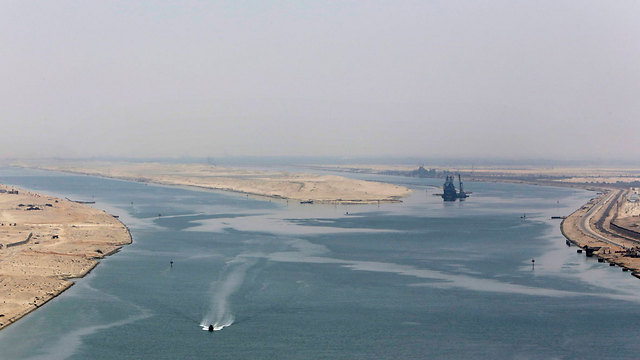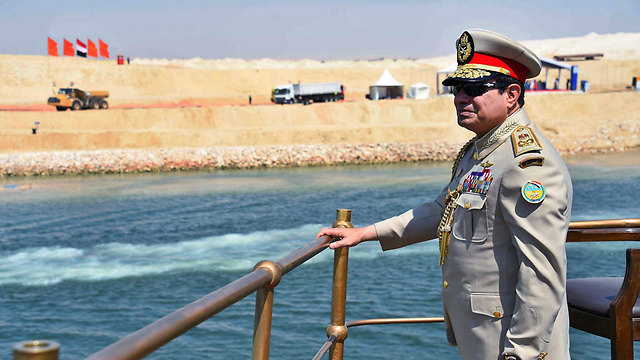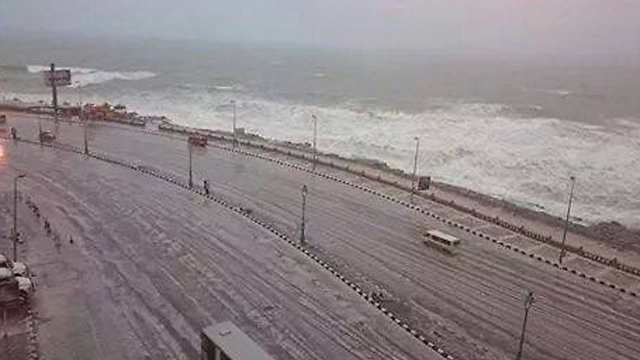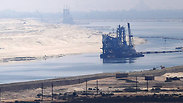
The new Suez Canal
צילום: רויטרס
The paradise that was Egypt
New documentary conjures up the world of post-WWII Egypt, when it was a multi-lingual, multi-ethnic society home to some 80,000 Jews.
Something, some ineffable longing, a combination of warm breezes and brisk multiculturalism, has spurred a distinguished line of former Egyptians to write about their condition.
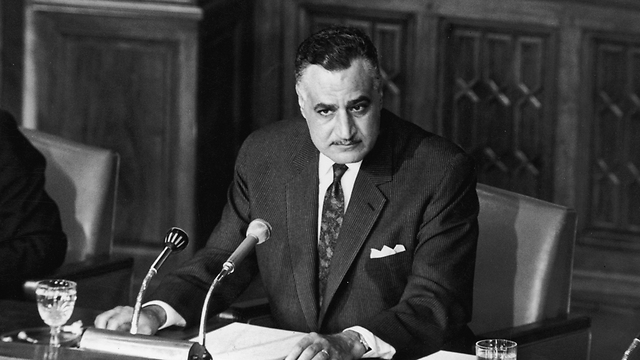
Take Claudia Roden, the renowned food writer and cultural anthropologist (born in Cairo, 1936) who starts her tiny gem of a gastronomic memoir, A Feast of Middle Eastern Food, saying, “I started collecting recipes for ‘A Book of Middle Eastern Food’ when Jews left Egypt after the Suez Crisis in 1956… During the next decade I saw waves of relatives and friends who stopped over in the city. Everyone was asking for recipes and offering theirs. We might never see each other again, but we’d have something to remember each other by.”
André Aciman (Alexandria, 1951) became an international literary star with his 1995 memoir, Out of Egypt, a tome seemingly spun out of silk, spice and a tender yearning to return to a life that had once been all-encompassing and then, seemingly out of nowhere, ceased to exist.
An entire world, gone.
Or take Lucette Lagnado, (Cairo, 1956) a writer for the Wall Street Journal whose own memoir, "The Man in the White Sharkskin Suit: My Family’s Exodus from Old Cairo to the New World", was widely acclaimed, opening her eyes as wide as a doll’s in the new Italian-made documentary, "Starting Over Again", and repeating what her father said to a social worker haplessly trying to help the family acclimate to America: “But madame, we are Arab."
Like many high-profile splits, Egypt’s divorce from the Jews left nobody happy.
The effect of Egypt remains indelible, and decades after they were forced to leave many former Cairenes and Alexandrians well up in tears and seem still to be stunned by the way things turned out.
Egypt, too, was diminished, never returning to the golden age of tolerance and prosperity it enjoyed in the first half of the twentieth century, when pattering in Greek, Italian, French, English and Arabic were part of an urban patois echoing around refined cafés and 80,000 Jews strolled along its corniches, directed its business organizations or established its political parties.
Everybody lost out.
Yet the film, directed by Ruggero Gabbai, an Italian best known for his searing documentaries on the Holocaust, and presented during last month’s Jewish Film Festival at the Jerusalem Cinemathèque, vividly conjures up the intense and stimulating life of urbane Egyptians inhabiting a mid-century utopia.
“The documentary is important for one reason,” Gabbai said in a conversation: “It shows the last generation that was able to live together maintaining different cultures and religions in a climate of tolerance and peace, enriching each other.”
The last generation in the Arab world? “No, in general. I don’t know of many cultures or countries where people were able to live together as they did in Egypt after the Second World War. For more than 30 years people prospered in an Arab country, living together, respecting and enriching each other.”
Gabbai’s father was born in Alexandria, the scion of an old Egyptian Jewish family, and attended Victoria College with Jordan’s future King Hussein and the scholar of Orientalism, Edward Said. “Today we are going backwards,” Gabbai says. “Not only in the Middle East. Where in the Western world do you see three cultures living distinctly but placidly together?”
The film offers viewers a mosaic of interviews with women and men ranging from Yvonne Barak, a hotel cleaner, to Egypt’s former Vice Foreign Minister, Elhami Elzayat, who try to describe the life-defining, shining moment that made them who they are.
The protagonists speak plainly in Arabic, express themselves in refined, cultivated English, in robust Italian, in precise, well-articulated French, in some Hebrew, a foreign tongue, and it is as if we are offered a window into a private wonderland in which each of these languages was part of a common currency.
Nissim Malki, the former CFO of El Al Israel Airlines explains, “We spoke English at school we heard all languages so it was a sort of a mixture, of all of those languages and we never at the end decided which culture we belonged to.” They called it “la dolce vita.”
Even as she describes with heartrending immediacy the suicide of her grandmother, who was incapable of coping with the thought of leaving Egypt and threw herself and her most beloved possessions down a stairwell, Ada Aharoni, who went on to found The International Forum for the Literature and Culture of Peace, offers up the culture of their unique lost paradise as an instrument for peace.
"Egyptian Jews have this imprinting which could be a bridge between Western and Muslim culture,” Gabbai says.
The Jews of Egypt were expelled from their country over a decade or so, by a cruel series of measures enacted by President Gamal Abdel Nasser following the Suez Crisis, in which France and Britain attacked after Egypt nationalized the Suez Canal.

Former Egyptian President Gamal Abdel Nasser. Drove Jews out of the country (Photo: Getty Images) (צילום: gettyimages)
It was the beginning of the secular Arab nationalist authoritarianism that persists today under President Abdel Fattah Al-Sisi. The film has never been screened in Egypt.
“Besides the genes that come from my father and mother, the whole of Egypt played a major role in making me who I am,” Elliot Malki, the Italian businessman who produced this film, said to The Media Line. “Egypt was so cosmopolitan. We were in Egypt but we were in London, Paris and New York all at the same time.”
The film, he says, “is about resilience. We learned it from Egypt and from our parents. It is about what happened after. How we created ourselves. It’s a few words about how much we counted."
Article written by Noga Tarnopolsky.
Reprinted with permission from The Media Line.










